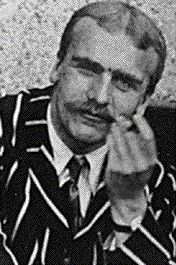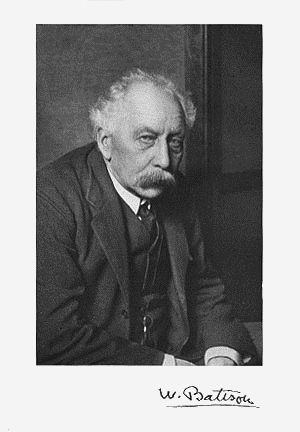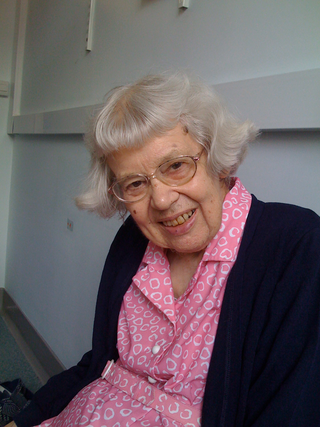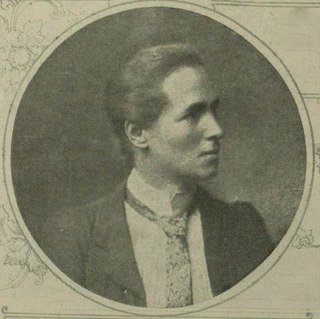
Thomas Hunt Morgan was an American evolutionary biologist, geneticist, embryologist, and science author who won the Nobel Prize in Physiology or Medicine in 1933 for discoveries elucidating the role that the chromosome plays in heredity.

John Burdon Sanderson Haldane, nicknamed "Jack" or "JBS", was a British-Indian scientist who worked in physiology, genetics, evolutionary biology, and mathematics. With innovative use of statistics in biology, he was one of the founders of neo-Darwinism. He served in the Great War, and obtained the rank of captain. Despite his lack of an academic degree in the field, he taught biology at the University of Cambridge, the Royal Institution, and University College London. Renouncing his British citizenship, he became an Indian citizen in 1961 and worked at the Indian Statistical Institute for the rest of his life.

Edmund Brisco "Henry" Ford was a British ecological geneticist. He was a leader among those British biologists who investigated the role of natural selection in nature. As a schoolboy Ford became interested in lepidoptera, the group of insects which includes butterflies and moths. He went on to study the genetics of natural populations, and invented the field of ecological genetics. Ford was awarded the Royal Society's Darwin Medal in 1954.

William Bateson was an English biologist who was the first person to use the term genetics to describe the study of heredity, and the chief populariser of the ideas of Gregor Mendel following their rediscovery in 1900 by Hugo de Vries and Carl Correns. His 1894 book Materials for the Study of Variation was one of the earliest formulations of the new approach to genetics.

Mary Frances Lyon was an English geneticist best known for her discovery of X-chromosome inactivation, an important biological phenomenon.

Reginald Crundall Punnett FRS was a British geneticist who co-founded, with William Bateson, the Journal of Genetics in 1910. Punnett is probably best remembered today as the creator of the Punnett square, a tool still used by biologists to predict the probability of possible genotypes of offspring. His Mendelism (1905) is sometimes said to have been the first textbook on genetics; it was probably the first popular science book to introduce genetics to the public.
Alfred Henry Sturtevant was an American geneticist. Sturtevant constructed the first genetic map of a chromosome in 1911. Throughout his career he worked on the organism Drosophila melanogaster with Thomas Hunt Morgan. By watching the development of flies in which the earliest cell division produced two different genomes, he measured the embryonic distance between organs in a unit which is called the sturt in his honor. In 1967, Sturtevant received the National Medal of Science.

Sewall Green Wright FRS(For) Honorary FRSE was an American geneticist known for his influential work on evolutionary theory and also for his work on path analysis. He was a founder of population genetics alongside Ronald Fisher and J. B. S. Haldane, which was a major step in the development of the modern synthesis combining genetics with evolution. He discovered the inbreeding coefficient and methods of computing it in pedigree animals. He extended this work to populations, computing the amount of inbreeding between members of populations as a result of random genetic drift, and along with Fisher he pioneered methods for computing the distribution of gene frequencies among populations as a result of the interaction of natural selection, mutation, migration and genetic drift. Wright also made major contributions to mammalian and biochemical genetics.

The history of genetics dates from the classical era with contributions by Pythagoras, Hippocrates, Aristotle, Epicurus, and others. Modern genetics began with the work of the Augustinian friar Gregor Johann Mendel. His work on pea plants, published in 1866, provided the initial evidence that, on its rediscovery in 1900, helped to establish the theory of Mendelian inheritance.
William George Hill was an English geneticist and statistician. He was a professor at University of Edinburgh. He is credited as co-discoverer of the Hill–Robertson effect with his doctoral advisor, Alan Robertson.
Dronamraju Krishna Rao was an Indian-born geneticist and president of the Foundation for Genetic Research in Houston, Texas. He was born in Pithapuram, in the state of Andhra Pradesh, India. One focus of his work has been the research of his mentor J. B. S. Haldane. As an author, his name is usually rendered Krishna R. Dronamraju. He died in Houston at age 83.
The Genetics Society of America (GSA) is a scholarly membership society of more than 5,500 genetics researchers and educators, established in 1931. The Society was formed from the reorganization of the Joint Genetics Sections of the American Society of Zoologists and the Botanical Society of America.

The Behavior Genetics Association (BGA) is a learned society established in 1970 and which promotes research into the connections between heredity and behavior, both human and animal. Its members support education and training in behavior genetics; and publish Behavior Genetics, a journal on the topic.
Leslie Clarence Dunn was a developmental geneticist at Columbia University. His early work with the mouse T-locus and established ideas of gene interaction, fertility factors, and allelic distribution. Later work with other model organisms continued to contribute to developmental genetics. Dunn was also an activist, helping fellow scientists seek asylum during World War II, and a critic of eugenics movements.

Florence Margaret Durham was a British geneticist at Cambridge in the early 1900s and an advocate of the theory of Mendelian inheritance, at a time when it was still controversial. She was part of an informal school of genetics at Cambridge led by her brother-in-law William Bateson. Her work on the heredity of coat colours in mice and canaries helped to support and extend Mendel's law of heredity. It is also one of the first examples of epistasis.

Edith Rebecca Saunders FLS was a British geneticist and plant anatomist. Described by J. B. S. Haldane as the "Mother of British Plant Genetics", she played an active role in the re-discovery of Mendel's laws of heredity, the understanding of trait inheritance in plants, and was the first collaborator of the geneticist William Bateson. She also developed extensive work on flower anatomy, particularly focusing on the gynoecia, the female reproductive organs of flowers.

Aoife McLysaght is an Irish geneticist and a professor in the Molecular Evolution Laboratory of the Smurfit Institute of Genetics, University of Dublin in Ireland.

Adrian Robert Krainer is a Uruguayan-American biochemist and molecular geneticist known for his research into RNA gene-splicing. Krainer holds the St. Giles Foundation Professorship at Cold Spring Harbor Laboratory in Laurel Hollow, New York.

Giles Yeo is the Professor of Molecular Neuroendocrinology at the MRC Metabolic Diseases Unit and Scientific Director of the Genomics/Transcriptomics Core at the University of Cambridge.














